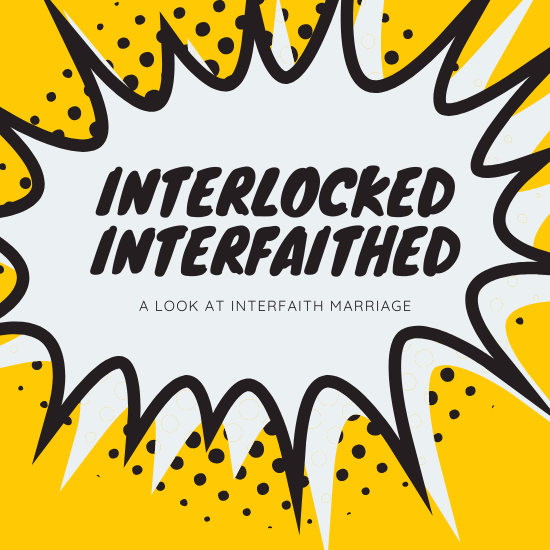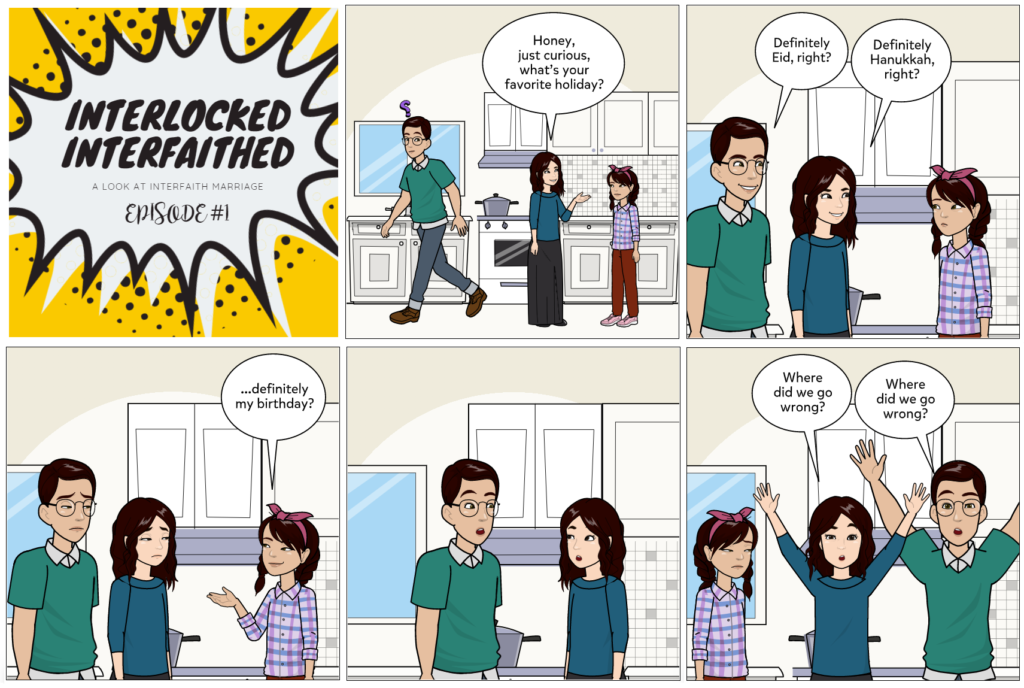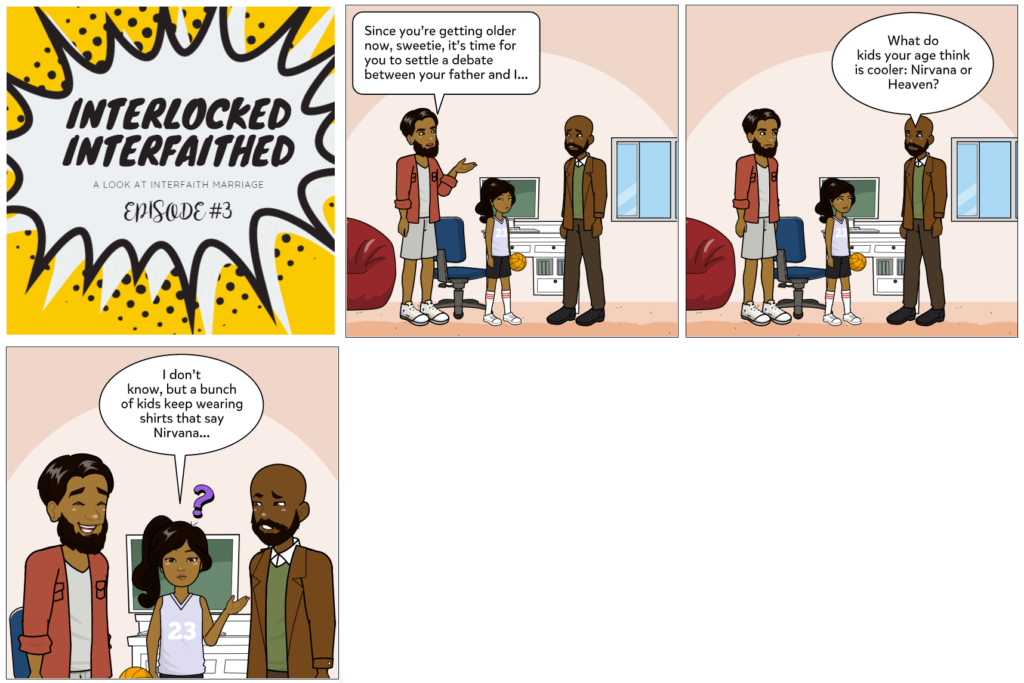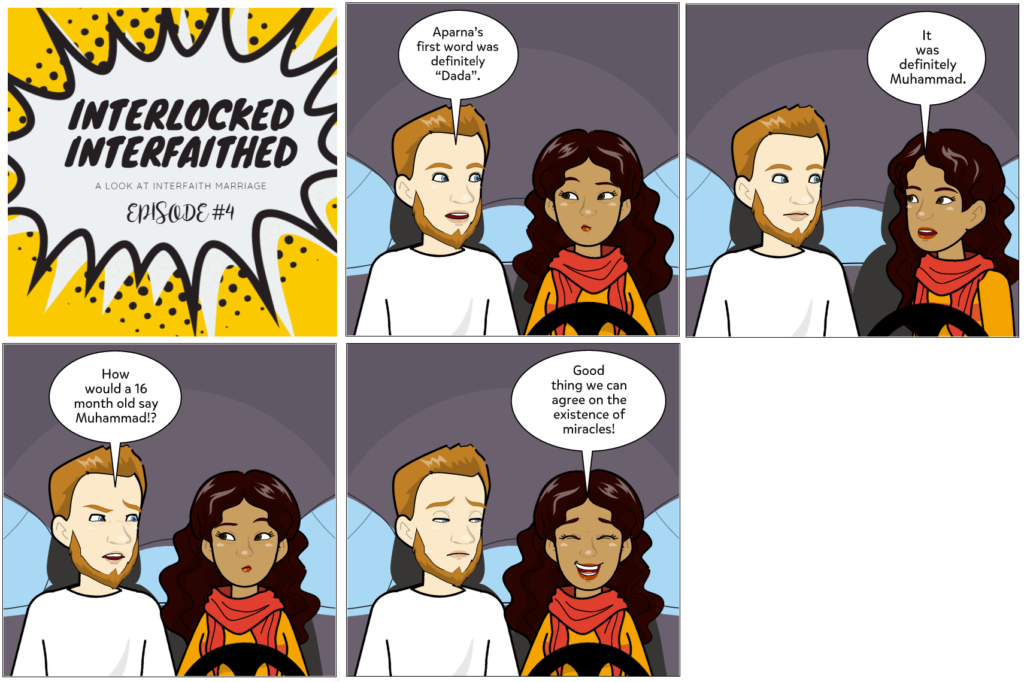
“I believe in recognizing every human being as a human being — neither white, black, brown, or red; and when you are dealing with humanity as a family there’s no question of integration or intermarriage. It’s just one human being marrying another human being or one human being living around and with another human being.” *
Malcolm X1
My inspiration for these comics resulted from my fascination with the paradigmatic sexual/romantic relationship (marriage) as purported by nearly all of the religions we covered this semester, and how interfaith dialogue would work in such an intimate setting. In our day and age interfaith marriage is becoming increasingly more common and less taboo. Opinions are still varied, of course, with fundamentalist believers more frequently believing that such marriages are designed to fail by nature. However issues will always exist in marriage beside religion, so how big do religious differences have to be? Does love truly conquer all?
In my research on the topic I found some unique issues within interfaith unions, with one central theme relating to some sort of “competition” between religions and what that means for the (potential) children. In what faith will they be raised? Are they supposed to choose? What holidays do they celebrate? Will they always fundamentally be at odds with one parent? How much could their parents truly believe in their religion if they are willing to cohabitate and parent with someone of a different religion?
All fascinating questions to be answered, of which I will explore a bit more in the following comics and with my own personal commentary and views, and a bit of musings and wondering.
Please note that each comic in this series is intentionally satirical or comedic, but it was not my intention in any way to undermine the sobriety of the issues located in these texts.

This comic centers on the relationship between a married Muslim man and Jewish woman, and their daughter. A central question when considering interfaith marriage is how two religions will gel together; there’s a significant difference between a marriage located in the Abrahamic faith traditions versus between a monotheistic religion and polytheistic religion. Since Islam and Judaism are of the former category, I found it interesting to speculate on how religious holidays will be celebrated and how it would impact a child.
Muslim men are allowed to marry “people of the book,” referring mainly to Jews and Christians, so technically this is a licit and permissible marriage on that side; Jewish laws are more stringent, however, and traditionally it has been harder, if even possible, for a marriage between a Jew and a gentile to be legal in the religious sense. These ideas then bring up the question on how these religions will clash: for example, Hanukkah is the celebration of the rededication of the Second Temple in Jerusalem. Would a traditional Muslim man be comfortable allowing his non-Muslim wife to teach their child about a holiday celebrating Jewish rites and rituals when the Qur’an (or the Revelation) has historicized the need for Jewish rites and rituals? Many tafsirs (Qur’anic interpretations) rule that Muslim men are only allowed to marry other “people of the book” because it is assumed that in a patriarchal, patrilineal culture, such as the one Islam is integrated with, the children will take the man’s religion.
That, too, is the reason why Muslim women can not marry outside the faith, as it is traditionally expected for them to defer to their husband. This begs the question: in a new society where patriarchy does not have such a strong grip, would it be possible for a Muslim woman to legally (in the religious sense) marry a “person of the book”?

This comic surrounds the cultural norm located in the United States involving “gender reveal parties,” but with a religious take. From some articles I read it seemed in many cases that even if the parents were able to set aside or embrace religious differences, the families of each person were often not as accepting and merely tolerant. Each side, too, often wanted to persuade the children of the interfaith unions towards their respective faith and encouraged it when around the children. Many times the parents would be asked what religion their child was, as if it was born a certain way or had had their faith already imposed on them from birth.
Another interesting facet to this pairing is the juxtaposition between a monotheistic religion such as Catholicism and a nontheistic religion such as Buddhism. There are oppositional beliefs surrounding baptism, the idea of a Creator God in the Catholic context, etc. Some Biblical Unitarians which are Christians who do not believe that Jesus was God incarnate, nor in the idea of the Trinity, do not get baptized and so can take on the identity of Christians and Buddhists. Thus, can a child be raised as both a Christian and a Buddhist? Can there be more nuance than is usually portrayed? The answer must be: clearly.

This comic depicts a same-sex relationship between two men, a Hindu and a Christian, which are religions in direct opposition with each other. I was wondering whether same-sex couples are more likely to be more tolerant and accepting with other religions due to their own experiences of bigotry and intolerance of their sexuality. Would a Christian be more willing to marry outside of Christianity if they are gay or bisexual? Are Hindus more accepting since their religion doesn’t specifically state that polytheism is blasphemy, like the Abrahamic faiths do? What would a child from such a union look like, especially if they were adopted? These cultures don’t seem like they would be compatible, unless the parties married were not very religious to begin with and didn’t take their faiths too seriously, at least from my perspective. Trying to reconcile too many different cultures could be detrimental to a child’s formation of their identity, especially if those cultures are rigid and don’t allow for nuance.
And, again, this comic focuses on the theme of “competition,” in a playful way. When deciding how to raise a child, does the child get a say? Or do the parents choose and should allow their child to offer feedback, either from their own perspective or from the world they are living and experiencing away from home? Conflict is not necessarily a “bad thing”; it can be quite productive in many cases, but where exactly the line is in regards to religion is quite blurry, especially if many societies/cultures are unwilling to accept an interfaith marriage.

In this comic, I went a different route; what happens when a Muslim woman, who is not traditionally allowed to marry outside of the religion (even other Jews and Christians), marries an agnostic man? In Islam, a common belief is that one should focus on their own path to jannah (“Paradise”), as your actions are the only ones you can control. Does that extend to a marriage? Furthermore, agnosticism encompasses a wide range of beliefs as to what God could be or whether a Creator God exists and more. Would there be a danger in a relationship between someone of a structured faith and an unstructured faith of either one erring to one side?
I also think this harkens back to what to teach a child. Would it be better to teach a child about a concrete idea of God “just in case” that’s the “true” religion? Is that a thought that crosses each parent’s mind, and would it be offensive to a parent without a concrete idea of God?
In any case, to my knowledge there are a lot of secular Muslims, which sounds counterintuitive until you consider that Islam is not simply a religion but a culture/lifestyle and the community is nearly impossible to leave, especially in Muslim-majority countries. Such as this is the case, it would make sense for a secular Muslim woman to be fine with marrying someone who has similar views but is not involved in the Muslim community, even if she is “betraying” the cultural norms of Islam.2
In Conclusion
This project has really helped me to grasp the enormity of interfaith marriage, especially as someone who is a religious pluralist. I also believe that through humor we can address some of these serious issues, and continue to build a global society that not only tolerates but appreciates the mixing of culture and belief systems. With the interconnectedness of humanity at it’s peak thus far in history, I hope that it is possible to continue these conversations!
Credit
1 This Malcom X quote can be found here.
2 For more a more expansive look at this idea, check out Kecia Ali’s Sexual Ethics and Islam, which you can find in a library near you here.
3 I used Pixton to create the comics.
I absolutely loved artwork. I think it helped get the ideas of the text across really well, and they were super interesting to look at. Your points were clear and I loved the creativity. My favorite comic was the last one, it made me laugh, but all of them were great!
This is such a creative way to explore a very real and current topic. Love is supposed to conquer all, but in the case of two religiously-conflicting partners, questions can arise. You pose many good questions here in a lighthearted way. If you know any interfaith couples, it may be an interesting next step to inquire about their experiences!
I really like how you kept the comics themselves very short and sweet (and yet also very clear) and then explained them in the captions. The comics themselves really grab audience attention and get them interested and informed while the captions take that learning curve a step further. I also think interfaith relationships can sometimes be a difficult thing for some people to talk about and your comics makes the topic seem very approachable, which is great!
What an amazing project! You medium chosen was a very entertaining way of presenting your ideas. I absolutely loved your use of comics to challenge the stereotypes of religion and marriage. Not only did I think you added great perspective on interfaith marriages, but I loves the integration of queer couples too!
What an amazing way to create a culturally relevant, engaging and informational piece of media.
Siera, I really liked the way that you chose to do your project, especially since I thought that your comedic effect was pretty funny. Jokes aside, it was extremely creative and well-done to emulate interfaith relationships and families in this way.
This was SO well done! I loved the use of comics to showcase a highly important and at times divisive topic. I liked that you made it a point to showcase diversity in different relationships–everything from race to sexuality to religion was very well thought out. Great work 🙂